The Polkemmet Pipe Band of the 1980s: a pipes|drums Reunion Interview – Part 1
Not too long ago, the local colliery sponsored many pipe bands in Scotland – coal mining operations that dotted much of the country’s central belt and east coast.
Woolmet & Danderhall, Bowhill & Seafield, Monktonhall, Dysart & Dundonald were bands of the past that were once supported by and named after collieries. Shotts & Dykehead Caledonia’s roots are as a colliery-supported band; the people of the village of Shotts once depended on coal mining as the major employer.
Back in the 1930s, the Whitrigg Colliery Pipe Band was sponsored by coal mining in Whitburn. Under Pipe-Major Johnny Barnes, the band rose to Grade 1 status, eventually changing sponsorship and name to Polkemmet Colliery.
In the early 1980s, Robert Mathieson and Jim Kilpatrick became pipe-major and leading-drummer of Polkemmet Colliery. They were in their early twenties and both learned through the Whitrigg juvenile system.
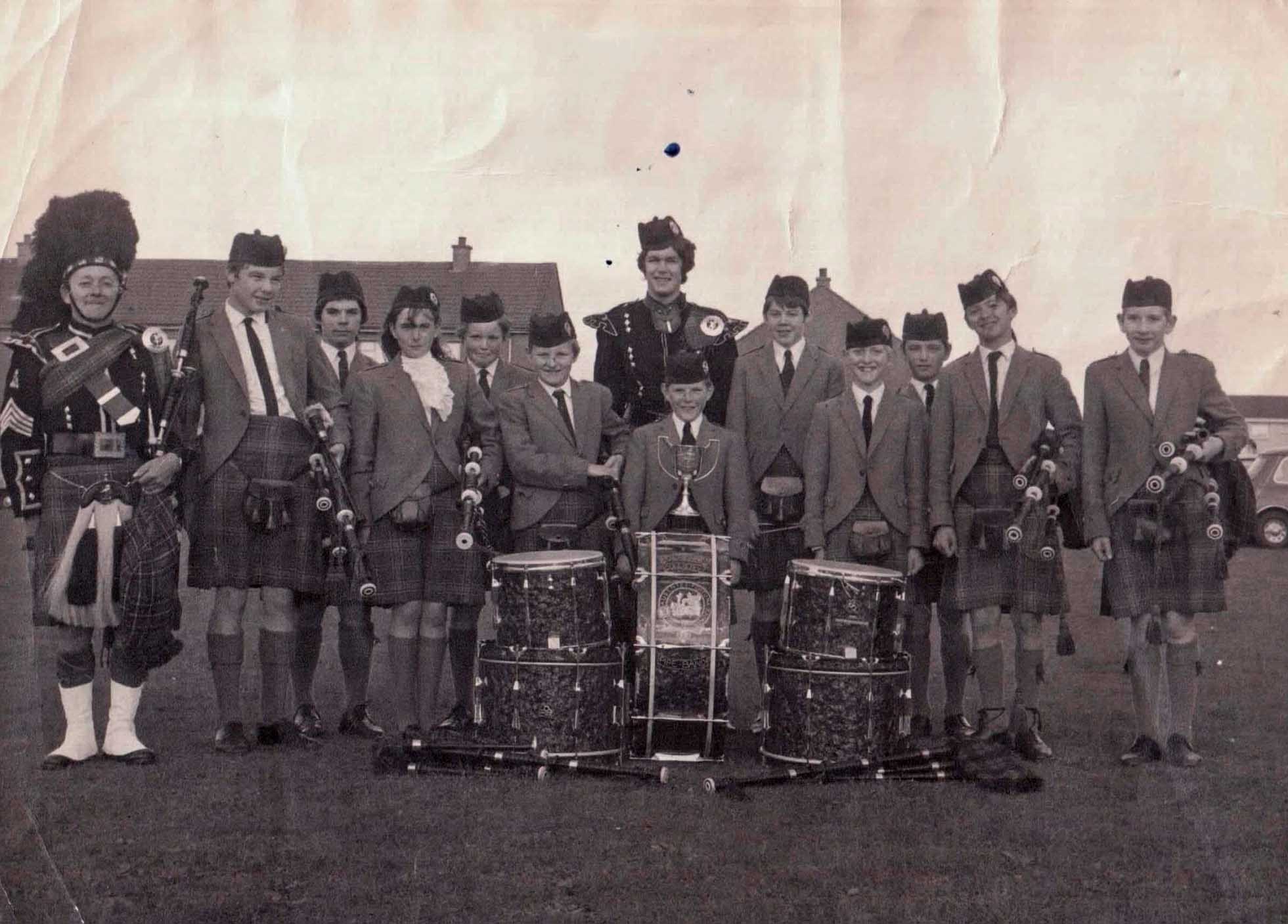
Mathieson and Kilpatrick had played in Shotts & Dykehead for several years and brought to Polkemmet the leadership skills they learned from Shotts legends Pipe-Major Tom McAllister and Leading-Drummer Alex Duthart.
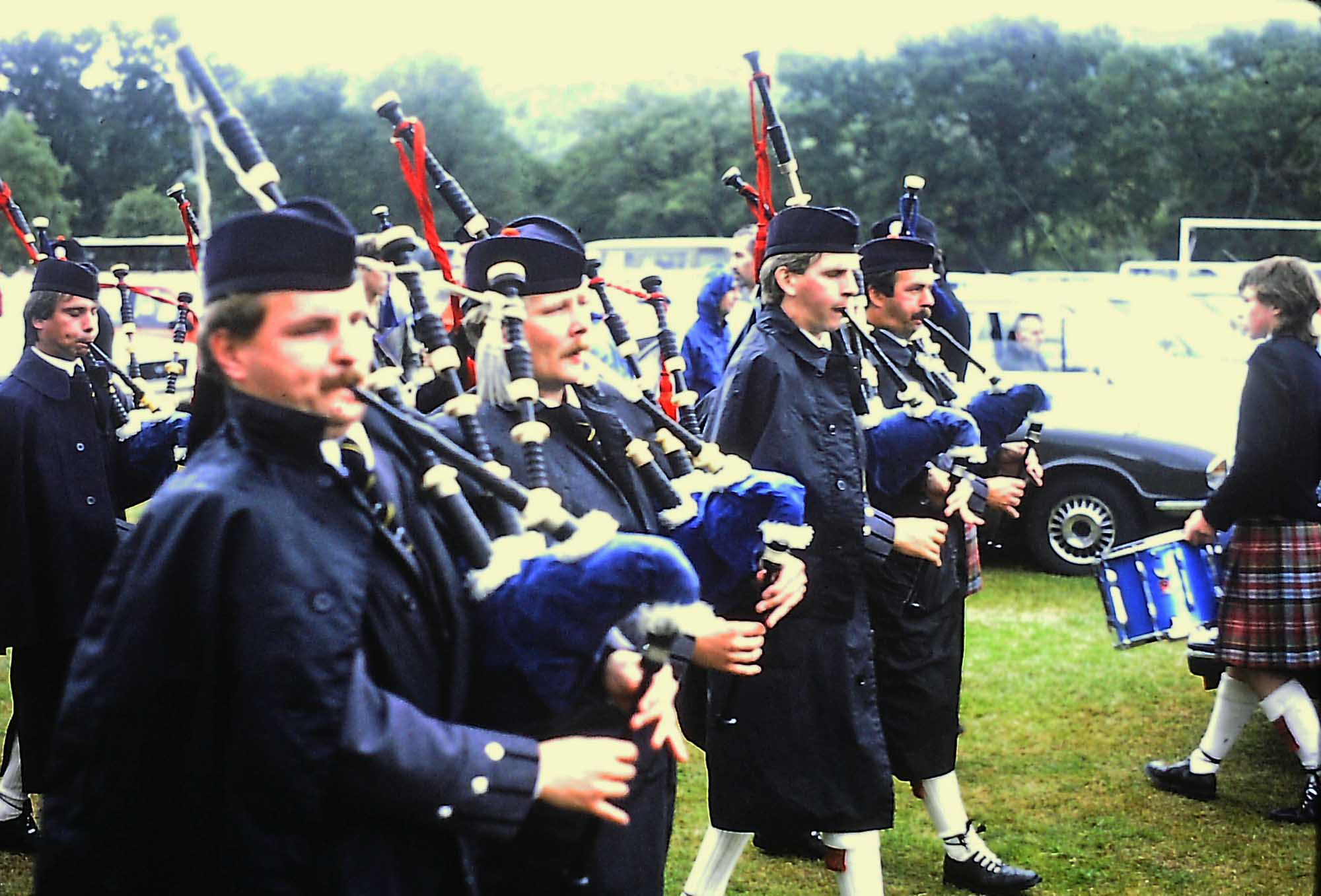
Polkemmet quickly rose to become a significant force in Grade 1, with a young and highly talented group of players ready to do things a bit differently.
The 1980s vintage of Polkemmet did concerts, made albums, and won a lot of contests. At a time when the Strathclyde Police were winning a record six consecutive World Championships, Polkemmet was hard on their tail. Polkemmet came close to winning major competitions, finishing second several times and beat Strathclyde Police at several non-major contests, which, back then, normally attracted more than 10 Grade 1 bands.
After the 1986 season, when Polkemmet was riding high, Mathieson and Kilpatrick returned to Shotts, a band that was clinging to life. Polkemmet continued for a year under Pipe-Major Ronnie Lawrie and Leading-Drummer Sandy Kilgour, but many of its members dispersed to other Grade 1 bands.
Polkemmet would go on to win major championships under Pipe-Major David Barnes (son of Johnny Barnes) and Leading-Drummer James King. But by the late 1990s, the band suffered more personnel losses, and ultimately closed down.
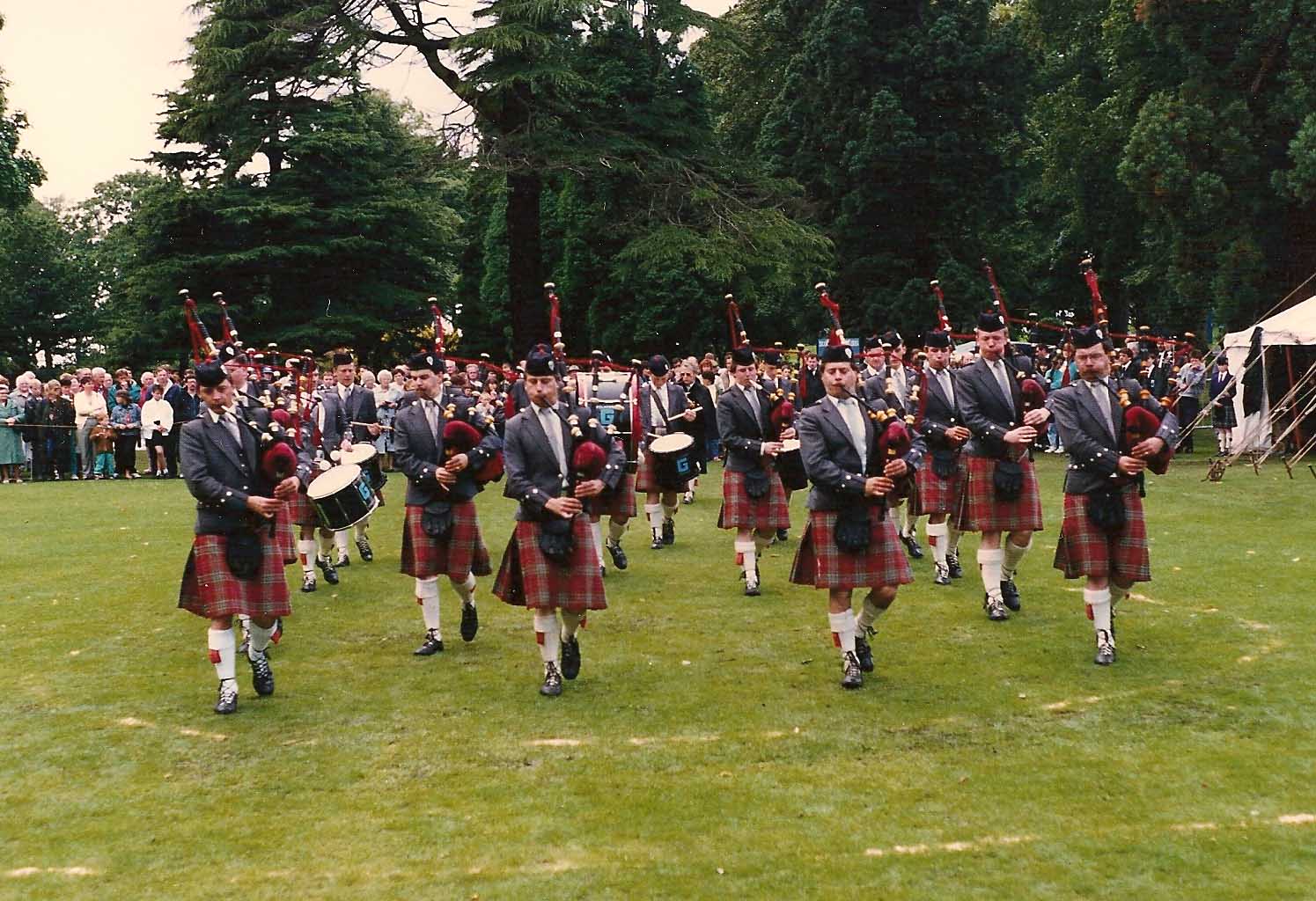
It is important to remember the 1980s version of Polkemmet. The band’s 1985 studio album, From Celtic Roots, is still heralded as a major success. Kilpatrick produced a championship-winning drum corps featuring 12 snare drummers (unheard of at the time), and the group can even be credited with introducing vests/waistcoats as the de facto uniform standard.
pipes|drums set out to get together a few of the 1980s Polkemmet Pipe Band members. Many who, at the time of the interview, were spread far and wide across the UK, Europe and other places, were not available, including then Pipe-Major Robert Mathieson and Leading-Drummer Jim Kilpatrick. Sadly, others, such as Sandy Kilgour, Harry King, James King, Fraser Mitchell and Alan Ramsay have passed on.
We hope you enjoy this two-part pipes|drums Reunion Interview with members of the Polkemmet Pipe Band of the 1980s.
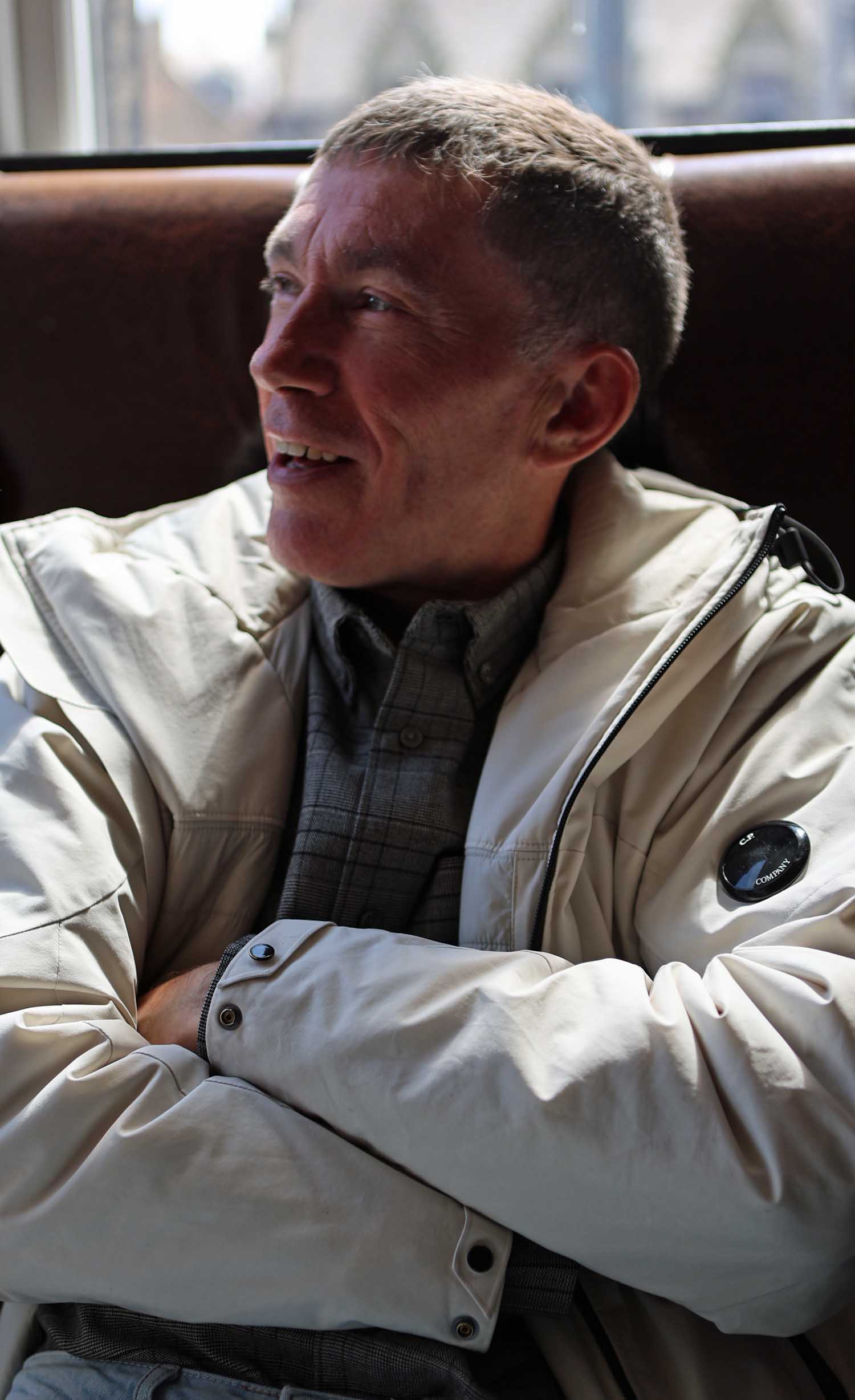
Brian Lamond joined Polkemmet as a teenager in 1985. From Inverkeithing, Scotland, he was a fast-fingered prodigy and a prized pupil of Captain John MacLellan. Lamond played with Polkemmet until 1988, when he joined the Grade 1 Vale of Atholl. He lived in Australia for several years, and was a member of the Victoria Police when the band won the 1998 World Championship. He’d later become pipe-major of the Grade 1 Dysart & Dundonald and he still competes successfully in solo competitions.
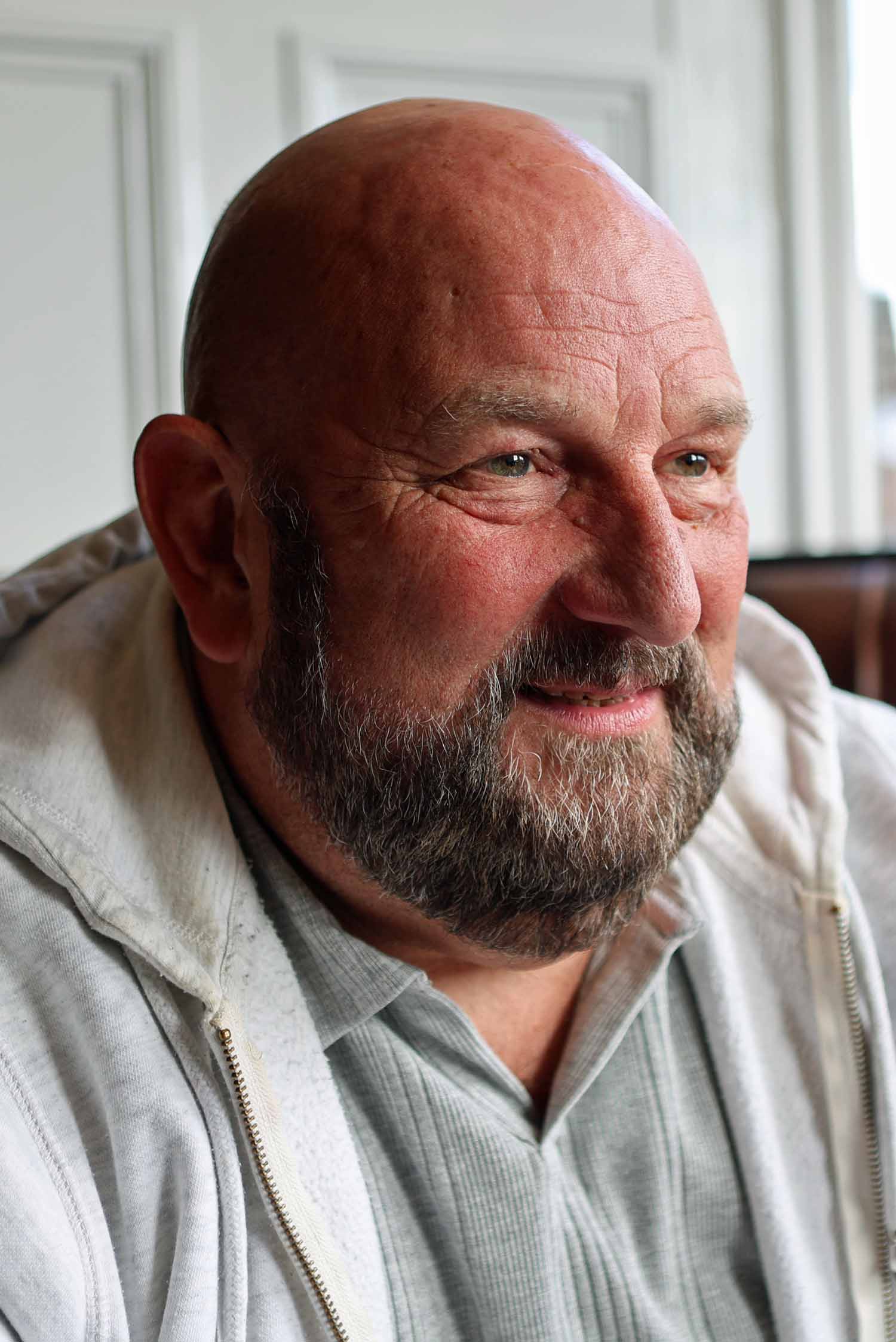
An ex-Scots Guardsman, Davey McRobert joined Polkemmet in 1985, enjoying the band’s most successful years under Mathieson and Kilpatrick. He would later become a member of British Caledonian Airways, playing under Pipe-Majors Harry McNulty and Roddy MacLeod, and eventually was a fly-in member of the Los Angeles Scots. He lives in Edinburgh these days.
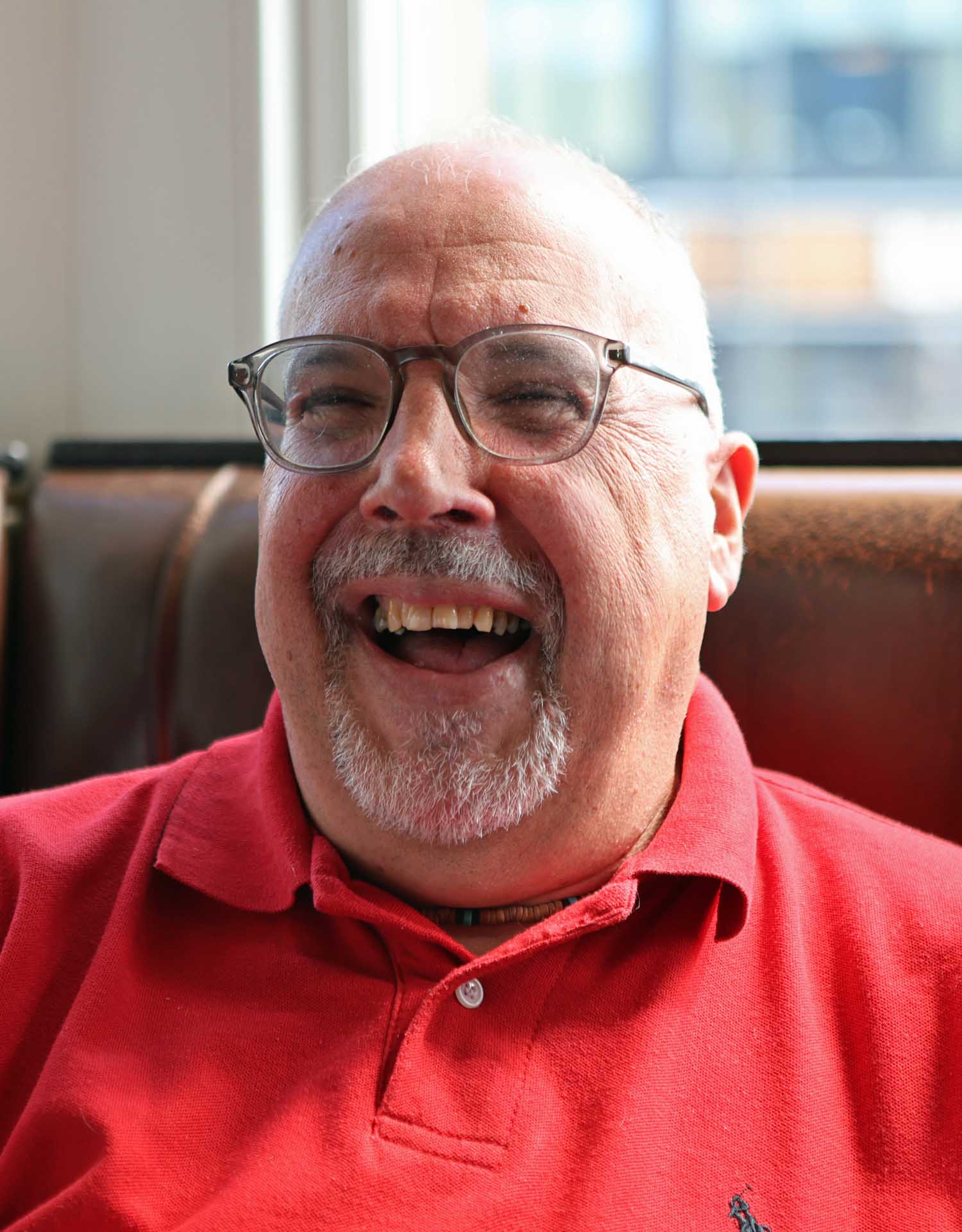
A native of Preston, England, Ian Morris was a stalwart Polkemmet piper. He had moved to Scotland and worked as a mechanical engineer, and soon found a place in the ranks of Polkemmet. He’d go on to be a member of Shotts & Dykehead and British Caledonian Airways. Now retired from competing, he lives in South Queensferry, Scotland.
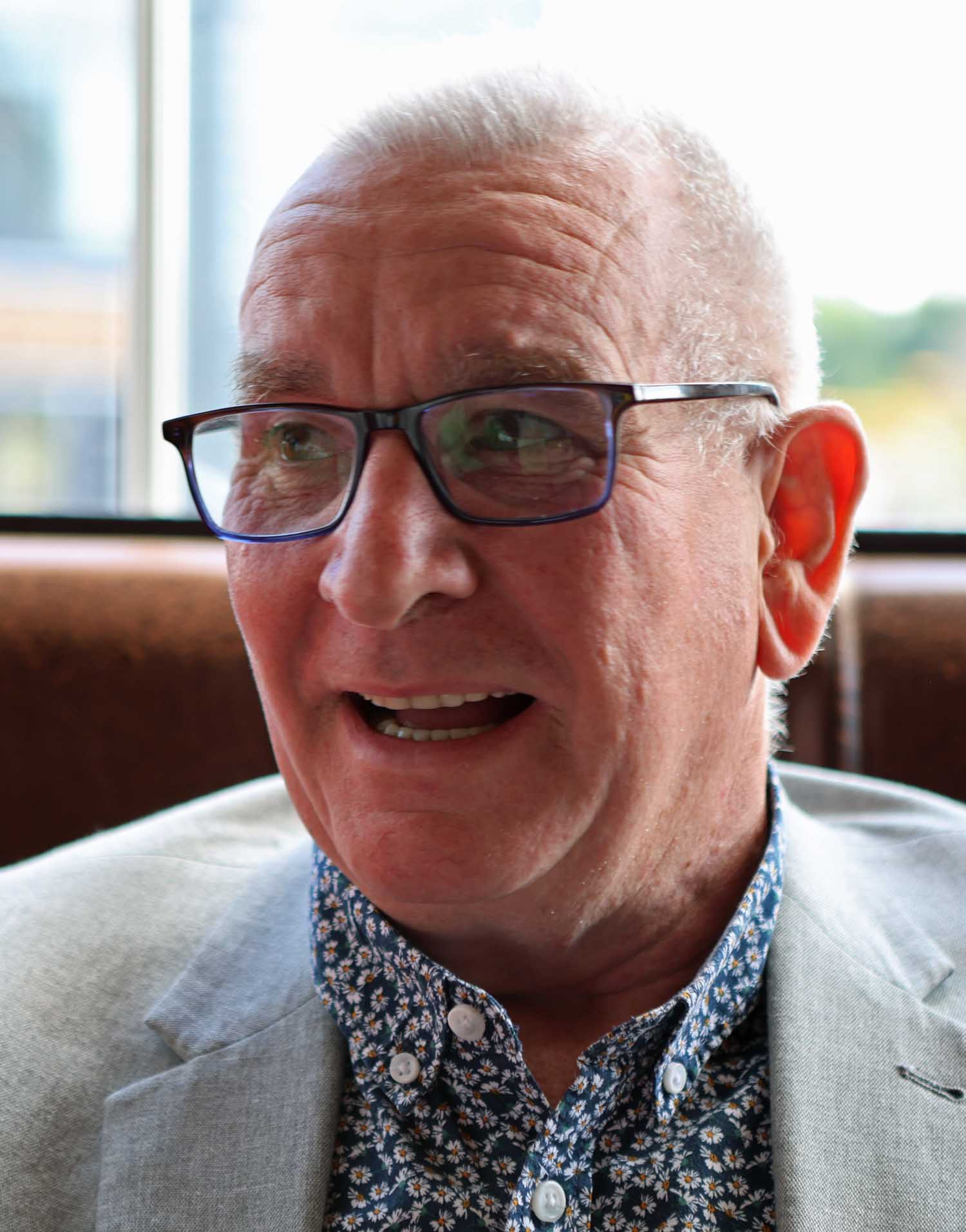
Gordon Stafford had also learned his piping through the Whittrigg Juveniles and Johnny Barnes. After serving with the Scots Guards, he joined Polkemmet and was one of several charismatic members. He would become co-pipe-sergeant in 1987, before becoming pipe-major of the nearby Grade 2 Torphichen & Bathgate, which he took to Grade 1. Stafford recently retired from competition, but keeps a close ear to the scene.
Andrew Berthoff, editor and publisher of pipes|drums, joined Polkemmet in 1983 as a student at the University of Stirling during his four-year undergraduate degree program at Macalester College in St. Paul, Minnesota. He would enjoy five years with Polkemmet, his last as co-pipe-sergeant, all while also competing in solo contests throughout the UK and Brittany, going back and forth to Scotland on several nine-month tourist visas before immigrating to Canada in 1988.
We hope you enjoy our two-part conversation with members of the Polkemmet Pipe Band of the 1980s.
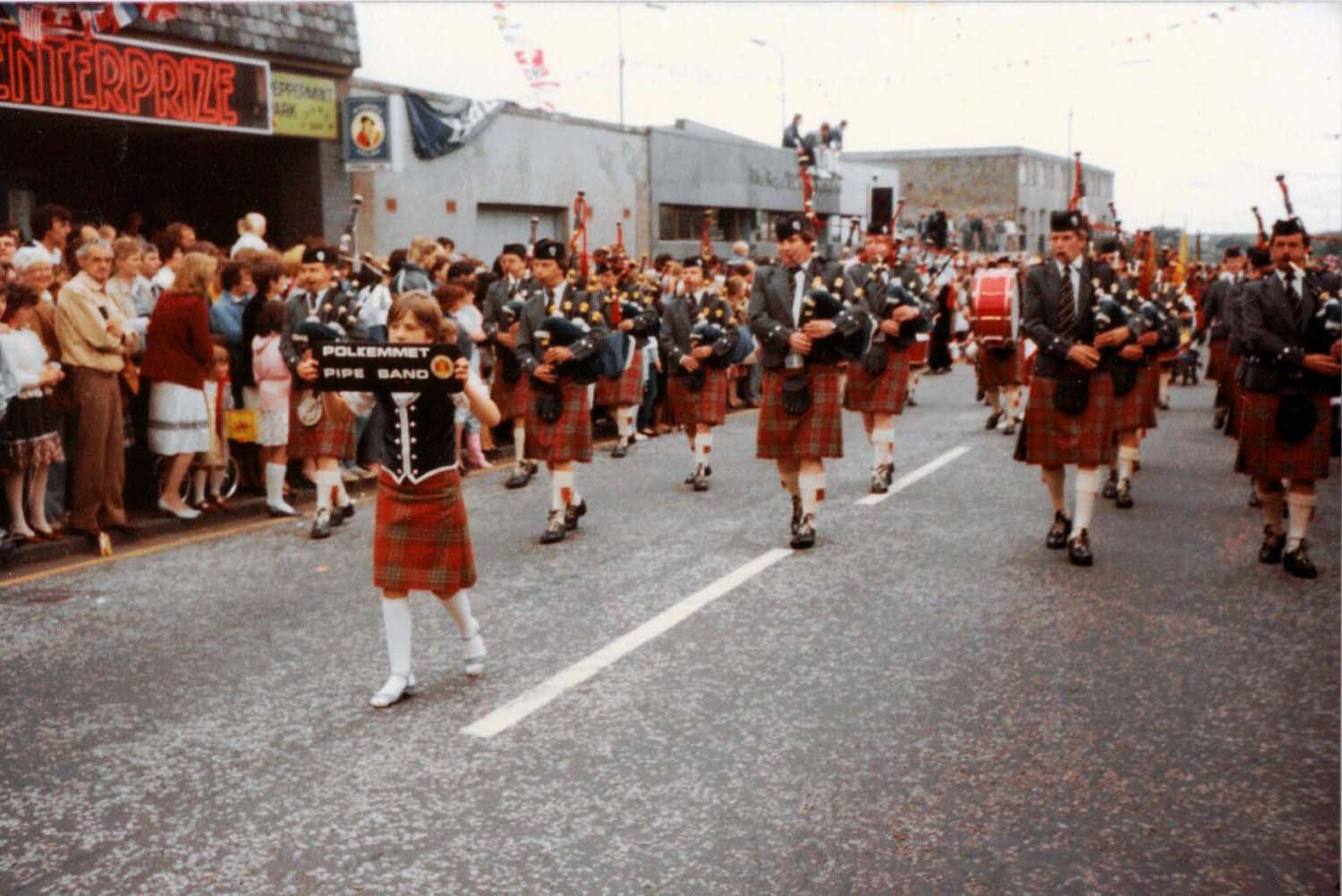
pipes|drums: We are here with 1980s Polkemmet Colliery Pipe Band members. We’ve got Davey McRobert, Gordon Stafford, Ian Morris, and Brian Lamond. Thanks very much for sharing some memories about a band that lasted a relatively short time but made quite a mark for the time. The 1980s, that version of the band under Robert Mathieson and Jim Kilpatrick. What are some of your memories of the 1980s vintage Polkemmet?
Gordon Stafford: I think it was a band that was ahead of its time, at that time. We pushed some boundaries. It was a band also that worked hard, but certainly played hard. We had some great times on and off the park. But some of the performances of the band were out of this world, for that time.
p|d: What about some of the standout performances? Davey, you were talking earlier . . .
Davey McRobert: Best two, I think, ’86 for me, were [the British Championships at Birmingham, England], which is the best contest I’ve ever played in. As I said earlier on, I thought somebody was going to trail a drone or something and when we stopped clean, I just thought, Oh, my God, we won this out the park. But judging circumstances said otherwise. And in the World’s, as well, that year, which was great. And probably should have nicked it, but we were under a Strathclyde Police umbrella at that time.
Ian Morris: I like the World’s ’85 for me at Hamilton. We’d just come back from a concert that we did in Lorient, and I thought both performances that day stuck out. We were third, fair enough. We got the same number of points as SFU were third or 78ths were third, I can’t remember.
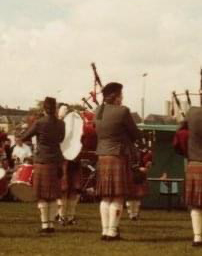
p|d: SFU. Yeah, that was the year SFU probably should have won, had it not been for one judge.
IM: But I thought that was, for me, that was a standout performance. Birmingham ’86 was another one. But I think some of the smaller contests we did 1985, I think we were unbeaten.
p|d: Yeah, and some of the trips, though, going to Lorient, those were pretty memorable, I think. Brian, you have any thoughts about that?
Brian Lamond: [laughs] Andrew, I said to you earlier, I was very young at the time. So, I just remember having a great time. The guys were on about performances. I wasn’t really interested in performances. I was all about having a good time. The music was good. That’s what attracted me to the band. That was my first Grade 1 band was Polkemmet.
DM: I think as Gordon said, everybody, but everybody worked their backsides off to make sure they were ready for when we went out.
IM: Well, we did two concerts in ’85. That Ballymena concert for me was fantastic. And we also repeated that in Lorient in the same year. Some of the music on that, most of it’s on the From Celtic Roots LP.
BL: You know what I remember about the concert? You remember the drummers painted their sticks with luminous paint, which didn’t work. There were just sticks going everywhere!
GS: [laughs] The lights went out.
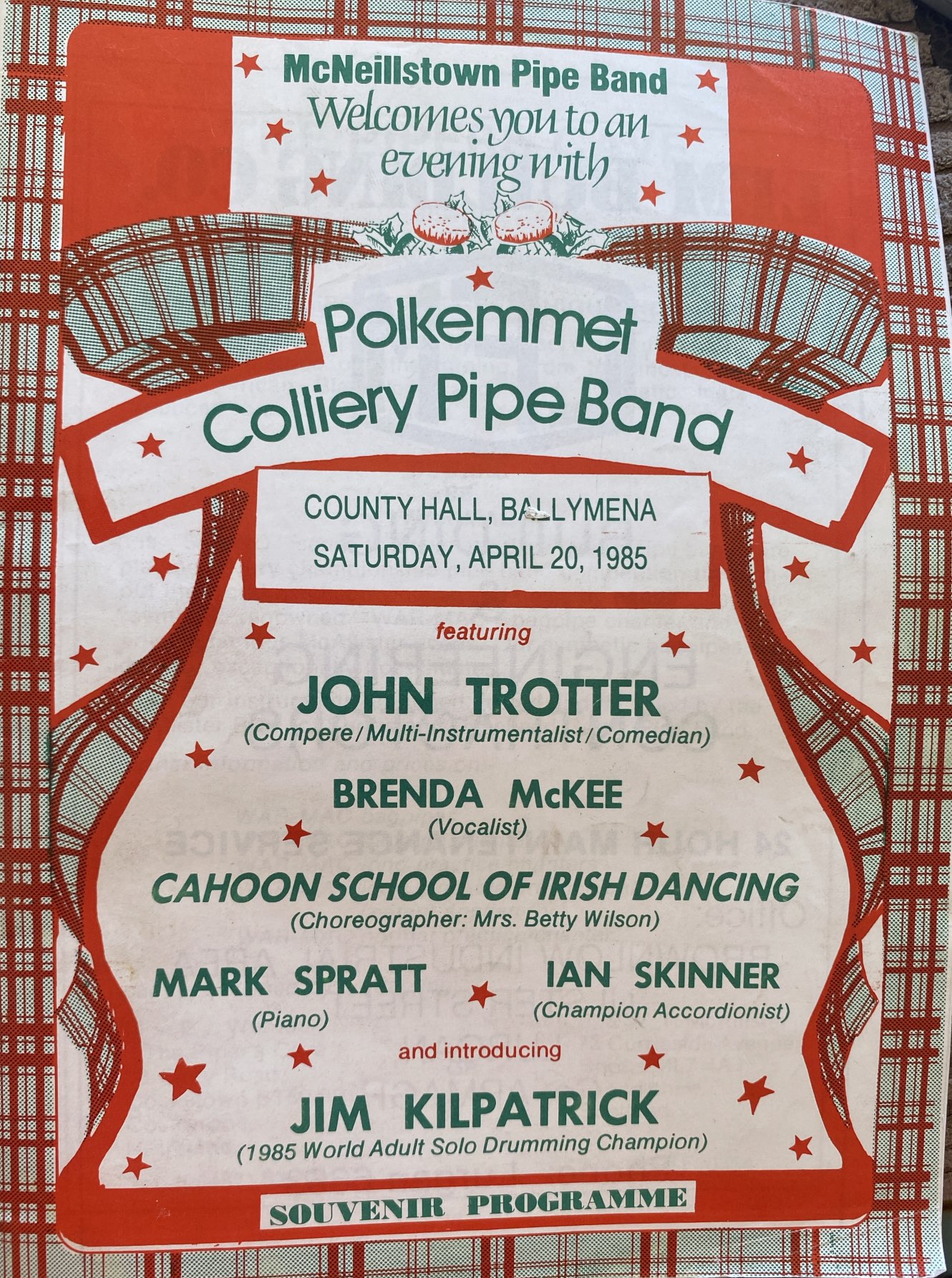
BL: It all went crazy when it came off. But I did have a laugh.
IM: We all had to have bow ties. Remember?
BL: I think it was at Ballymena, wasn’t it?
GS: And they forgot to put the blue light on so that it could show the sticks.
BL: That’s about all I could remember about that!
GS: So, it would show their sticks when they threw them up in the air. But remember the front row of that concert could maybe see something but nothing else. Crazy.
BL: There were drumsticks everywhere.
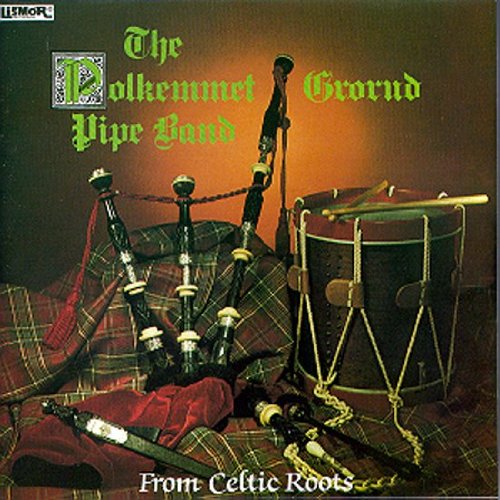
GS: But again, from that concept, we did the Celtic Roots album. And what I remember about that, again, we pushed the boundaries getting other guys in. The Saturday, we recorded 75% of the album. Freezing cold, there was no heating whatsoever when we were doing the recording. The snow was lying about four to five inches deep. We drove home on the Saturday. We came back on the Sunday. Some of us couldn’t get home, we had to stay at Davey Robertson’s – six of us. And then we come back on the Sunday. Rab [Mathieson] and Jim [Kilpatrick] had managed to organize to get some heating put in, paraffin heaters.
IM: We did the whole album.
GS: And we recorded the whole album on the Sunday.
IM: A lot of it was only one take. A lot of it we did in one take.
p|d: That was a world-class album at the time.
DM: One of the medleys was named “One Take.” A certain member.
IM: We’d played that first medley was it, “Brigadier Snow.” It was our number-one medley that year. We had that off. I think it was the second medley we kind of struggled a little bit.
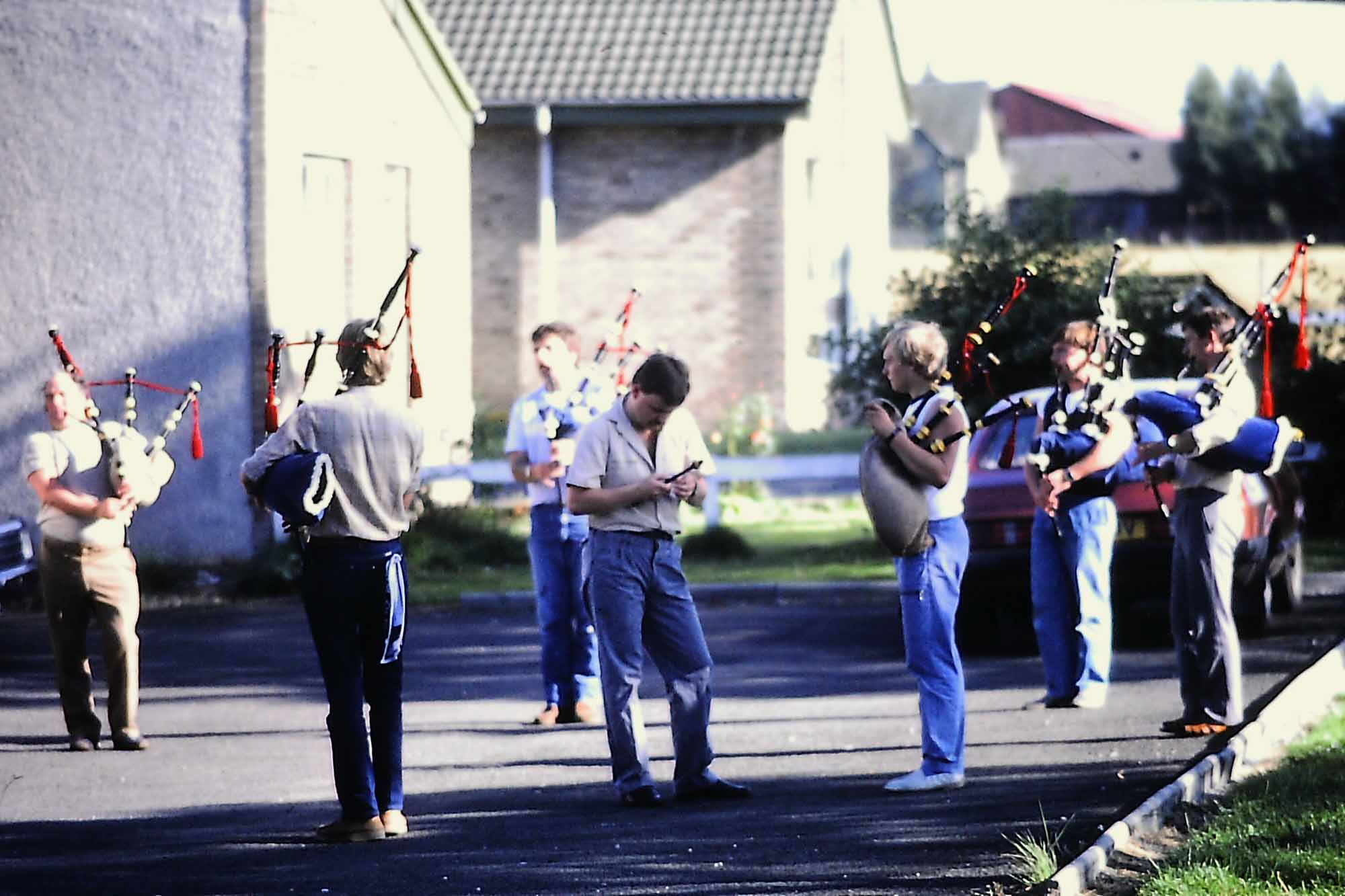
p|d: So, the band, definitely Robert Mathieson had a strong vision musically. The band was wearing the gray jackets and the waistcoats.
IM: Which was unusual. I mean everybody wore black jackets back then. They definitely had a change towards something different, being different and standout, which is what he did. And that was Rab. That was Rab maybe and Jim at that time, they decided that’s what they were going to do.
p|d: Musically, if you look back at the band, do you think the band stood out at that time? Brian, you mentioned joining the band because of the music.
BL: I remember the first time I heard the band; I think it was at Markinch. I was playing in a Grade 2 band at the time and I remember they played “Jack’s Welcome Home.” It was the opener. And I thought it was great. I think “The Kesh Jig” and “Rocking the Baby” were in the same medley. And it was different, eh? And that’s what attracted me to the band. And the great jackets. The jackets looked nice.
IM: It was music. I think it was musical.
GS: I think 99% of that was down to Rab, his influence.
DM: It was Jim as well. I mean, even when the sticks didn’t work, our drummers were doing stuff that nobody else was doing, no other drum corps was doing.
“The crowds used to surround us at every contest, we played on were just phenomenal. Wanted to listen to Polkemmet.” – Davey McRobert
p|d: So, you listened back at it and it might not sound that different or it might sound old-fashioned today. But at the time, really sticking your neck out and trying to make a mark differently with doing things differently and being courageous.
DM: I think people recognized it, as well, because the crowds used to surround us at every contest, we played on were just phenomenal. Wanted to listen to Polkemmet.
IM: We’ll all agree; it’s something we all wanted to play in, you know. I don’t think anybody else was doing the same thing, but it’s something we all wanted to play in. That’s why we all joined the band in the first place because it was doing maybe something different or looked something different. And we all wanted to play in that.
GS: I think most of us at that time were in our twenties, so we were fairly young. Yeah, we’d all played for awhile . . .
BL: I was only a teenager, by the way. I was only a teenager!
IM: [laughs] You were the youngest.
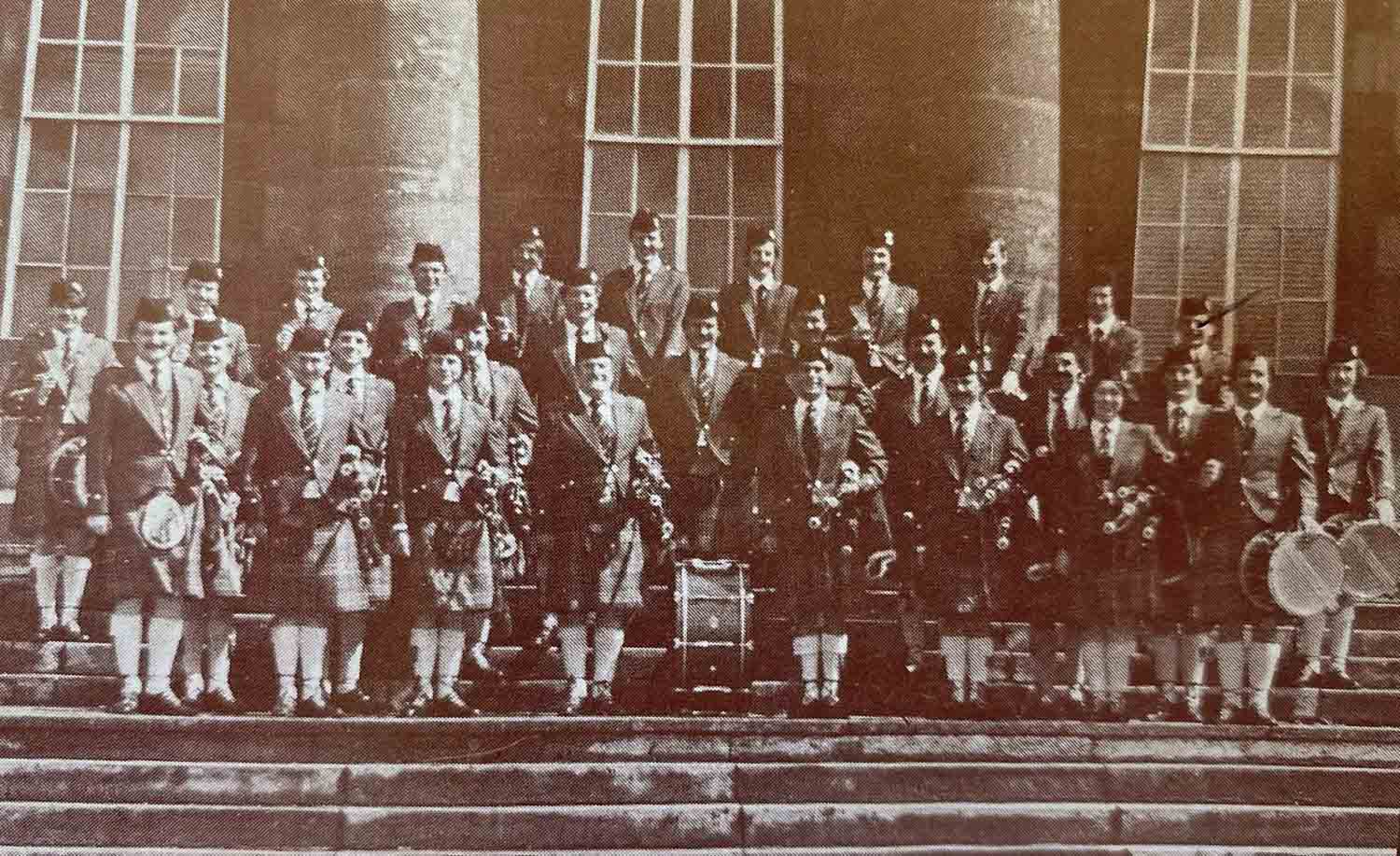
GS: You joined as a boy and a year later you were a man. [laughs] For different reasons. But, aye, you were young, you were a teen.
IM: It was fun going to practices. I mean sometimes practice can be a drag, but it was fun going to practices. We all wanted to go to. It was to go and meet your friends rather than you just going to practice.
BL: Robert Mathieson used to come and get us; he used to drive and get me. Take me to the practice and take me home.
IM: If I couldn’t get there. He used to come and pick whoever else up as well. He put a lot of work into it then.
p|d: Yeah, he put up, coming over. Lots of lifts.
IM: He did a lot for that. He did a lot for us all.
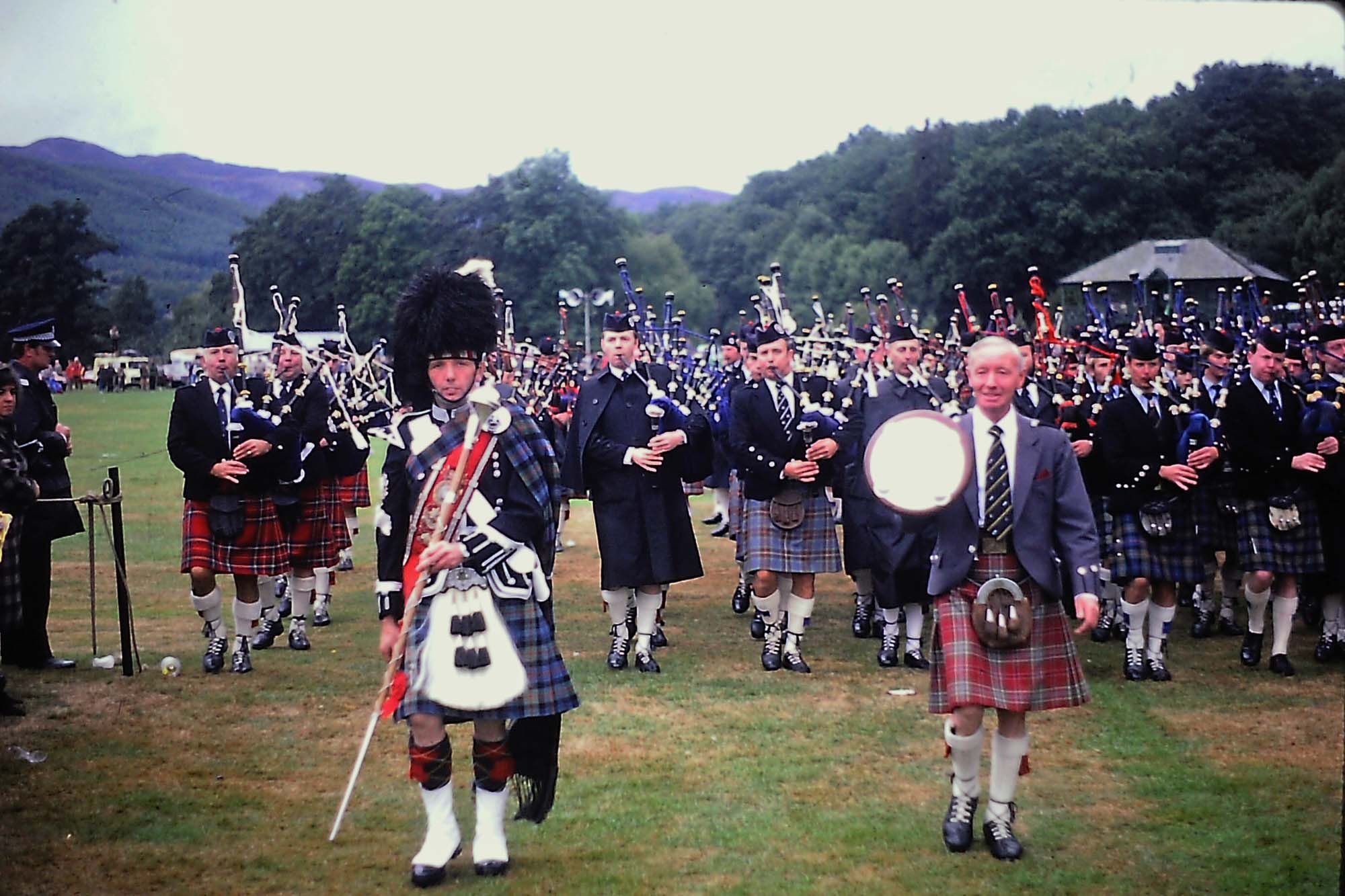
GS: Yes, definitely. A big influence.
p|d: So, it was at a time, though, that the Strathclyde Police were in full sail. One of the world’s greatest bands and still is today on their string of consecutive World’s victories and almost unbeatable. But Polkemmet was there doing things differently and actually beat them several times. Maybe Lesmahgow, I remember one year.
GS: I think that hurt a bit more at some of the major contests. We played well at a smaller contest and that seemed to be recognized and we got victories. But when we went to the majors, we played just as well. We didn’t seem to get the recognition. Then, having said that, you can’t take anything away from Iain McLellan’s band. They were like a machine at that time. Outstanding. But I do think there are a couple of times we should have won.
p|d: Yeah. And that was, I think, was it Birmingham?
GS: Birmingham.
IM: 13th.
DM: Should never have judged a game.
IM: But back in the day, it’s still going on to this day. They look at it a bit more because it’s not points anymore now, it’s placings. So, you can moan a bit more. I don’t think you could do that with the points days, but they can do it now on the position days. So, I think they’re looking at that to try and even things out a little bit anyway. But it did happen. In those days it was just down to points and that was all you got, and that was it.
p|d: It was easier to be a rogue judge and get away with it.
IM: It was deflating that, yeah.
DM: It was easy to take a couple of points off your tone, 15 tone mark, and that was you.
IM: Everybody came off that smiling, thinking… nobody had said, “Don’t like that.” Everybody came off thinking all around, all around the band was great. And we came on. I think we won the drumming, I think, maybe. And I think, right, we’ve got this and then Boghall won. And you think, what? And then we got third at that. I think that night was pretty down. Well, only for a little while. [laughs]
p|d: Very close. Second at Cowal. Strathclyde Police first.
IM: I think we got second a couple of times at Cowal. Third a couple of times at the World’s.
p|d: So, knocking on the door.
IM: Absolutely, all the time, I think. I think ’84, ’85, we were never out the prize list.
p|d: And Vale of Athol were doing pretty adventurous stuff, too, for the Scottish bands. And, Brian, you ultimately decided to join the Vale a little while after Polkemmet. So, similar kind of ideas going on at the Vale?
BL: Yeah, probably, yeah. Different tone. It was different. It wasn’t the same.
p|d: It’s not like Polkemmet was the only band doing things differently.
IM: I think the Vale were doing something. They were just coming up at the time, weren’t they? I mean when ’85, ’86-
BL: By the time I joined them, they were well on the way too. They had their own style of playing, eh?
p|d: I think they won a major in the early ’90s.
BL: Yeah. I just joined because of Gordon [Duncan].
IM: Oh, they had good arrangements with Gordon Duncan. I mean, if you look at the more innovative composers at the time, Rab was one and Gordon was another, that you would say their compositions. So, I think Rab’s more leaned towards the ensemble side of things. And I think Gordon’s more leaned towards piping and the creative.
p|d: Rab, I think when he continued on, was with Jim often would write tunes, I think, with percussion in mind. The percussion came first sometimes.
GS: That’s right. They worked together on it, you know, to create the ensemble effect and sound. And that was one thing that we did have at that time was good ensemble.
p|d: The band also was kind of, I don’t know, a little bit rebellious.
IM: Yes. That’s why he wrote “Ragtime Pipers.” Because that’s why, I think, somebody said, “Look at this bunch of ragtag pipers coming up.” And Rab wrote a tune called “Ragtime Pipers,” which we did play in the selection.
GS: I think we did play hard off the park. Once the serious stuff was finished with the competition, then away we went. That was the first time that I’d seen “the coffin” coming out. The great big box filled with ice.
DM: Aye. Bubbling. [laughs]
GS: And any alcoholic drink that you wanted to mention was poured then. Perhaps half an orange, half an apple and one bottle of lemonade.
IM: And that was it.
GS: Put the cover on, leave it. Then go out and then come back. And by that time it was ready and right. And that was us all night. Oh, fantastic.
p|d: Some trips like that, remember the opening of the Macallan thing up in the Highlands. That was a fun trip.
IM: We forced the bus to stop on the way coming back. We stopped at Pitlochry. I think back then, I think we all did Bacardi and Coke. Everybody was drinking Bacardi and Coke. We poured into some pub in Pitlochry. It was Bacardi time.
GS: We did taste some of the Macallan in the boardroom because we were left on our own with some sandwiches and some warm beer, endless beer. So, we decided to try some of the whisky out of the decanter. It could have been 10-year-old, 20-year-old, or a 100-year-old whiskey. [laughs] We didn’t care. We took the decanter down and we lifted a glass gifted from Westminster, and we each had a small taste and we drank that much that we had to top it up with water, put the decanter back and dried the glass with the curtains. [laughs] And then sat with innocent faces.
p|d: I remember a few cases of whiskey being loaded onto the bus in secret.
BL: It was carnage. It was carnage coming home.
IM: I got a bottle home.
GS: There were at least two crates.
IM: There were two crates. I think we drank two bottles on the way going home. But we got a bottle, I think we nicked it. We took a bottle.
BL: Aye, we got a bottle each.
IM: We got a bottle each.
p|d: I have a memory of a pipe box going over a stone wall or something. Someone got fed up with their pipes and threw them over the wall. On a different topic, there were judges, obviously, and there were judges who sometimes had their favourites. But do you remember any judges who seemed to like Polkemmet, especially?
IM: Andrew Stoddart was one that brings me to mind. He had his first in Birmingham. Trevor Dear, maybe?
GS: Trevor Dear quite liked us. Yeah.
IM: I’m trying to think of judges back then. J.K. [McAllister]?
p|d: Alan Ronaldson, maybe?
IM: Yeah, maybe Alan. Yeah.
p|d: He was just new to the panel then.
IM: George Somers was fairly new back then. I’m trying to think who else.
Stay tuned for Part 2 of our 1980s Polkemmet reunion interview coming soon.

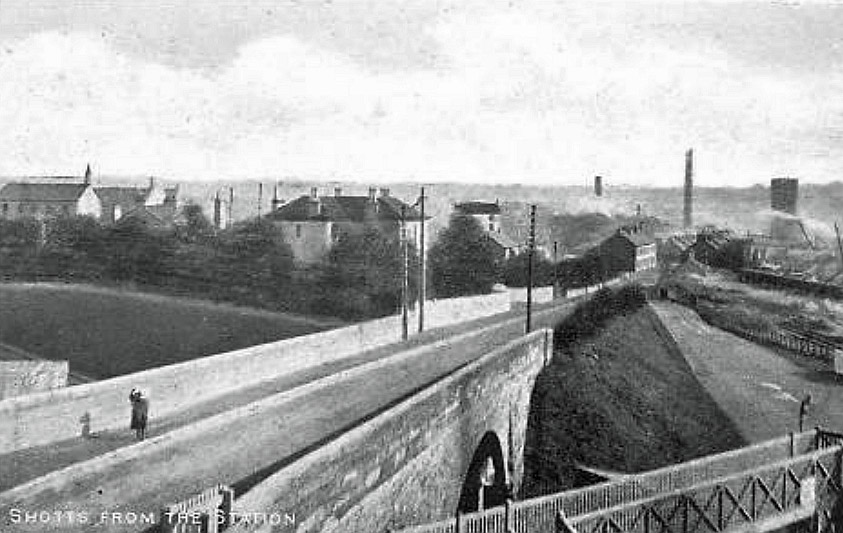
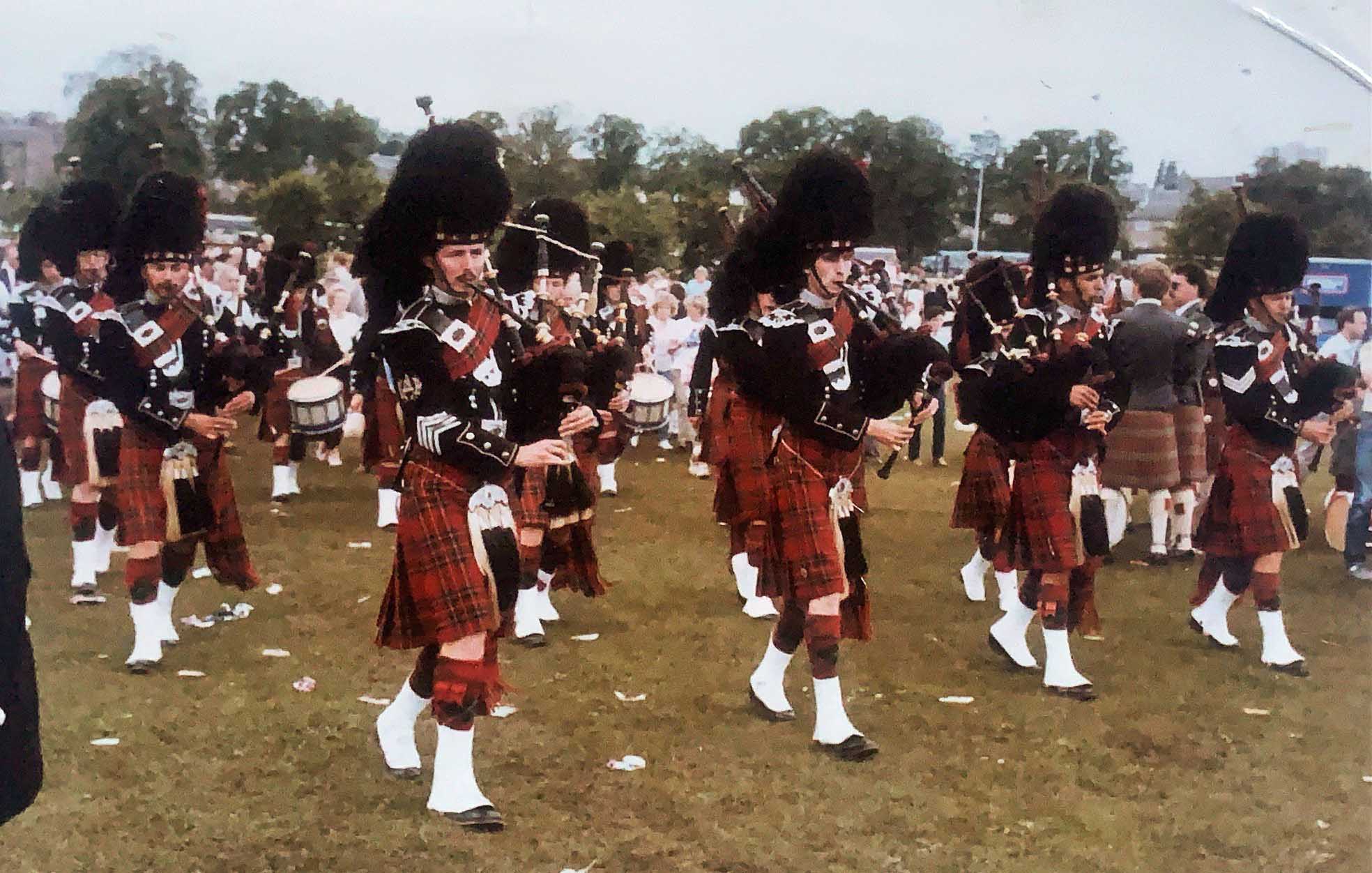


I didn’t know you played with them, Andrew!
You forgot to mention Bilston Glen as one of the great colliery bands. (What a great name for a band!!!). Grade 4 to Grade 1 in as many years. PM Archie Pinkman.
Interestingly, despite being upgraded multiple times, they never won the Worlds in any grade.
The loss of the colliery bands was a loss for Scottish Grade 1 piping/ drumming. The Miners Gala grade 1 contest in Holyrood Park was always a great event.
Very enjoyable interview. I really recognise the work hard, play hard narrative in pipe bands. The drinking culture was absolutely wild in my day, Friday nights of the World’s weekend was party night. Which when you think of it now, is amazing in a way. It all seems so much more disciplined and civilised now, which can only be a good thing. But I have great memories of great days and nights in the pipe band. Very much like the four guys. And the fingers going on the table, so funny, I think all pipers carry on the same way